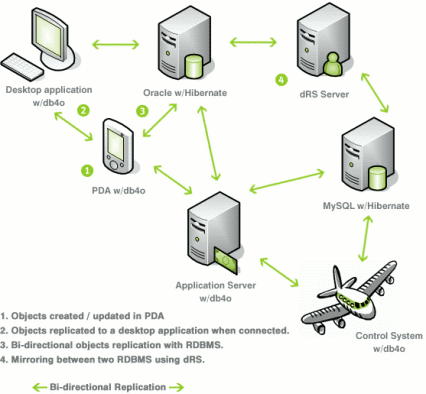Java, .NET object database syncs with enterprise RDBMSs
Jan 27, 2006 — by LinuxDevices Staff — from the LinuxDevices Archive — 4 viewsDb4objects has added a replication product to its dual-licensed portfolio of object database technology available under both a commercial license and the GNU GPL. The “db4o Replication System” (dRS) lets developers create applications capable of synchronizing Java or .NET objects bi-directionally with Oracle, MySQL, and other enterprise RDBMSs (relational database management systems), the… company says.
Db4objects released its flagship object database product under the GPL in December of 2004, announcing eight months later that db40 had become the most widely used software package of its kind. Db4o stores Java and .NET objects natively, without requiring conversion to SQL or another format. Such “native object persistence” makes for a lighter-weight, faster database suitable for a variety of “agile and mobile enterprise” applications, including real-time control, enterprise software, mobile electronics, game consoles, medical equipment, and automotive systems.
Db4objects says its new dRS product can provide automatic uni- or bi-directional data synchronization between db4o client-side database instances and enterprise RDBMSs, allowing mobile and distributed application developers to exploit db4o's native object persistence architecture, while retaining compatibility with existing software infrastructures.

dRS supports a variety of synchronization strategies
(Click to enlarge)
Embedded market analyst Chris Lanfear, director of research at Venture Development Corp., stated, “The launch of the dRS strengthens db4o's position as an embedded, client-centric data persistence solution for object-oriented environments, and acknowledges the predominance of legacy RDBMSs in server-centric environments.”
Availability
DRS is available now for the Linux operating system. It can be downloaded at no cost under the GPL (registration required), and is also available in a supported, commercially redistributable version described as “affordable.”
This article was originally published on LinuxDevices.com and has been donated to the open source community by QuinStreet Inc. Please visit LinuxToday.com for up-to-date news and articles about Linux and open source.